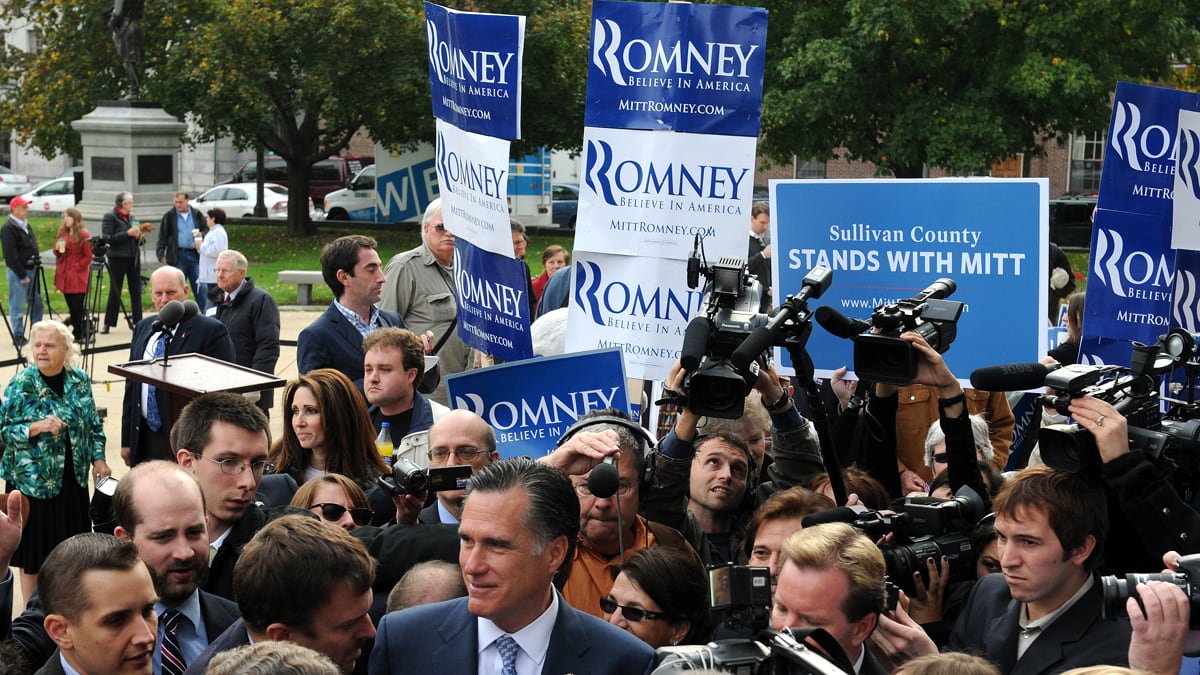There are no presidential flavors of the month in New Hampshire. Other Republicans may be in hot pursuit of anyone but Mitt Romney, but in this state he’s a true frontrunner, with a double-digit lead that has never faltered.
“He’s worked it hard. They’ve paid attention to details. And I think you get to know people over time,” former governor John Sununu told me this week at the state capitol in Concord, where Romney was about to file his candidacy papers.
These are the voters who know Romney best, from his four years as governor of neighboring Massachusetts and his presidential run in 2008. Since then he has kept his organization alive and tended conscientiously to the needs of New Hampshire Republicans. He even has a vacation house on Lake Winnipesaukee. And a CNN/Time poll out Wednesday gives Romney a crushing 40 to 13 percent lead over Herman Cain, a far bigger margin than his leads in the other key early states (Iowa, South Carolina and Florida).
Beyond the home-field advantage, Romney’s efforts would be futile if the dogs didn’t like the dog food, as the saying goes. But in this case they seem, at the very least, to prefer it to the other choices in dog food. Familiarity has not bred contempt. Rather, it’s fostered a sense of “best guy for the moment we’re in.”
Romney’s fate hangs on whether Republicans elsewhere will reach the same conclusion. So far, polls show, they haven’t. And with Rick Perry rebooting his campaign with new advisers, new policies, and an escalating assault on Romney, perhaps they never will.
Still, all the pundit talk about inevitability didn’t seem so farfetched during Romney’s visit to the capitol. Though it was a weekday, he was greeted by several hundred supporters, more than a dozen TV cameras, and a smothering media crush inside Secretary of State Bill Gardner’s tiny office. It’s no longer 2008, when John McCain won New Hampshire and the GOP nomination. “You can tell. There’s a feeling. Everything just seems like it’s falling into place the right way,” Romney’s son Tagg told me. “So he’s the same person. The circumstances are different, circling around him.”

The Romney of 2012 does bear many similarities to the Romney of 2008, and some of them are not helpful. He’s still the candidate of policy reversals—ABC News recently compiled a list of his top five contradictions; the Democratic National Committee has a website called “Which Mitt?”; and the Perry team just created a new Twitter hashtag: #FlipFlopMitt. He’s still a Mormon, making him a nonstarter among some on the Christian right. And, unforgivably to many conservatives, he is indelibly the father of “Romneycare.”
None of those is a deal killer in the nation’s first primary, scheduled for early January. Part of the reason is the nature of those who live here. Many people are transplants (PDF) from states like New York, New Jersey, and Massachusetts, where Republicans tend to be moderate. In addition, according to Gallup, New Hampshire is one of the least religious states in the country. It also has a libertarian streak encapsulated by its “Live Free or Die” motto and what GOP strategist Rich Killion of Concord calls a “live and let live” ethos. New Hampshire Republicans “don’t want anyone to infringe on their freedom, and they wouldn’t think of infringing on anyone else’s,” Killion says. As for a candidate’s religion, “they wouldn’t think it’s anyone’s business.”
The bottom line is that evangelicals and the Tea Party are less influential here than they are in Iowa and South Carolina. And the overriding issue of the election—the economy—happens to dovetail with the issues that concern New Hampshire Republicans. They are driven by “a fiscal conservatism that borders on fierce,” as senior Romney adviser Tom Rath described it to me.
Into the economic maelstrom steps Romney, with a business background, an Olympics turnaround on his résumé, and a commanding manner. He may not have all the answers in an age of globalization and Europe on the brink, but he has convinced a lot of people here that he can whip things into shape.
Patrick McDougal, 36, of Salem, moved to New Hampshire from Massachusetts in 2000 and owns a small video-production company. Romney, he says, is “really the only candidate that can bring jobs back.” Another supporter, Beth Ragan, 56, of Nashua, who left New Jersey for New Hampshire in 1990, says, “He’s proven he can deal with difficult issues.” Kirby Jappe, a 21-year-old college student and Romney volunteer, calls him “a brilliant guy who is the most experienced in the private sector. He’s the only man to fix the economy.”
An only slightly less rosy view came from Bob DeGange, 56, a Manchester salesman who moved to New Hampshire from New Jersey nearly 20 years ago and appeared in a Romney ad last time around. “I don’t know if anybody can get us out of this mess we’re in,” DeGange told me. “But he’s the only one who’s qualified to make an attempt.”
The premise in these responses is that business experience is key to fixing the economy. Perry is challenging that with his record of job growth as governor of Texas; Romney is trying to focus on what he sees as ++President Obama++[]’s failures.
At his rally here the other day, he rattled off a remarkable list of what he asserted were Obama policies that didn’t work—remarkable because two of them were never enacted (cap-and-trade, card check); one hasn’t fully happened yet (“Obamacare,” with major provisions effective in 2014); and another provided a substantial boost to the economy, according to the nonpartisan Congressional Budget Office (the 2009 stimulus package). Romney finished with an appeal tailor-made for the "Live Free or Die" state: “President Obama and his friends believe that America should be a nation led by government. They’re wrong. America should be led by free people choosing their course in life.”
The state capitol features a display with scores of political buttons, and Romney—whose dad ran for president in 1968—seemed fascinated. His gaze went from LBJ to Nixon-Lodge to eight-time presidential loser Harold Stassen. “That’s a button you can use in multiple years,” he said with a laugh. He sounded almost awed as he exclaimed, “I found my dad’s! Isn’t that something!” Then he broke out laughing again: “Right above Stassen, unfortunately.” It was the laugh of a man who knows he has a good chance to do far better than either Stassen or his own father.





